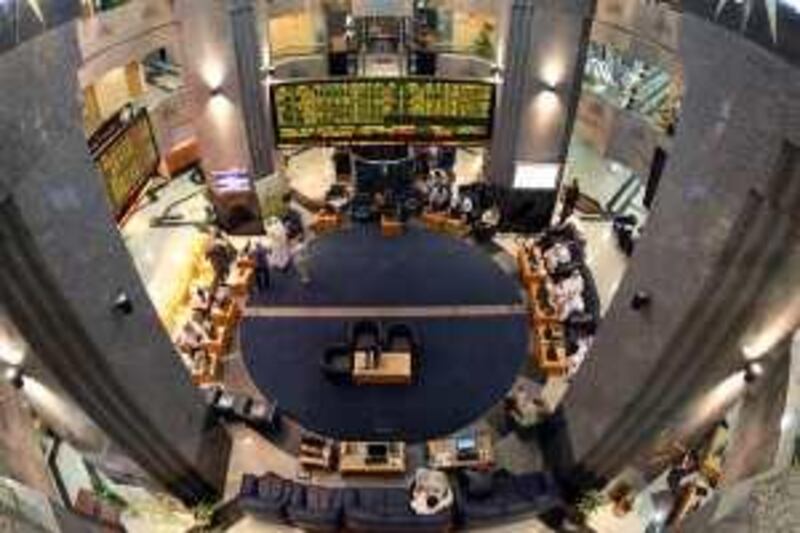Stock markets in the UAE, Qatar and Kuwait rallied Wednesday to reach their highest levels for the year, extending a bullish run that started in the middle of last month as Qatar Telecom said it successfully sold US$1.5 billion (Dh5.5bn) in bonds and Credit Suisse raised its outlook for the Dubai Financial Market to "outperform". Dubai's stock index ended the day up 1.3 per cent, raising its gain since May 20 to 51 per cent and chalking up its highest close since last November as Credit Suisse, the large Swiss investment bank, raised its view on the Dubai Financial Market from "neutral".
Stocks in Abu Dhabi were up 3.1 per cent, the highest close for the index since Nov 20. Gainers were led by Abu Dhabi Commercial Bank, up by 9.6 per cent, and Aldar Properties, up 8.7 per cent. Etisalat, the UAE's largest telecommunications company, climbed 4.5 per cent. Doha's stock index also climbed by 1.7 per cent following Qatar Telecom's announcement to reach a high for the year, and Kuwaiti stocks extended a run to 10 advances in a row, inching upwards by 0.4 per cent and reaching another high for this year.
"Huge amounts of cash are coming back into the markets as investors look six months down the road," said Fadi al Said, the head of equities for the Middle East at ING Investment Management. "The stability in global markets and the strong oil price is boosting sentiment about the region." The advances came as the UAE's interbank lending rates - a key measure of liquidity, or the ease with which banks can obtain money to lend - declined to around 2.47 per cent. The three-month Emirates Interbank Offered Rate had climbed as high as 4.42 per cent last December, making it much more expensive for banks to borrow.
Oil prices have also been climbing.Oil closed yesterday at around $67 a barrel. While these are encouraging signs, concern has emerged in recent months about the extent to which loan defaults may affect bank profits in the UAE. Many banks have set aside large pools of capital to provision for the possibility that more customers will find it difficult to make good on loans. "A lot of investors are saying the banking sector will make the next major move upward," said Chamel Sahmy, a senior sales trader at Beltone Financial. "We will have to wait for the second-quarter results to see how provisions are affecting bank profits, but with rising liquidity, their performance should improve from the first quarter."
Globally, the outlook appears equally sunny, though analysts and government officials are urging caution as the world's major economies try to reverse ballooning deficits and high unemployment rates. The chief executive of NYSE Euronext, one of the world's largest stock exchanges, said yesterday that he was "a lot more confident" that a three-month trend upwards in global stocks was sustainable given more-robust trading volumes.
"At the end of March I was apprehensive because I thought the market had gone up so much so quickly that it didn't feel like a fundamentally driven rally to me," the chief executive, Duncan Niederauer, said yesterday in Amsterdam. "I was nervous that the fundamentals hadn't really changed and we hadn't seen enough volume." The MSCI World Index has climbed 44 per cent since March, thanks to a surge in financial and industrial stocks and a rising tide of optimism surrounding a possible global recovery from the financial crisis.
Mr Niederauer had said in April that investors were looking for a broad rally with high trading volumes; he said yesterday that volumes in April and May were "quite steady". Still, the signs from the US, the world's largest economy, have not all been positive. While a bigger than expected increase in US home sales has led to growing optimism that the recession might be easing, Ben Bernanke, the US Federal Reserve chairman, said at a congressional hearing yesterday that the loss of almost six million jobs since the beginning of last year and a sharp decline in GDP still pose significant challenges for economic recovery.
"A number of factors are likely to continue to weigh on consumer spending, among them the weak labour market, the declines in equity and housing wealth that households have experienced over the past two years, and still-tight credit conditions," he said. Mr Bernanke also urged yesterday for the US government to reduce its $2 trillion deficit. with Agencies afitch@thenational.ae






